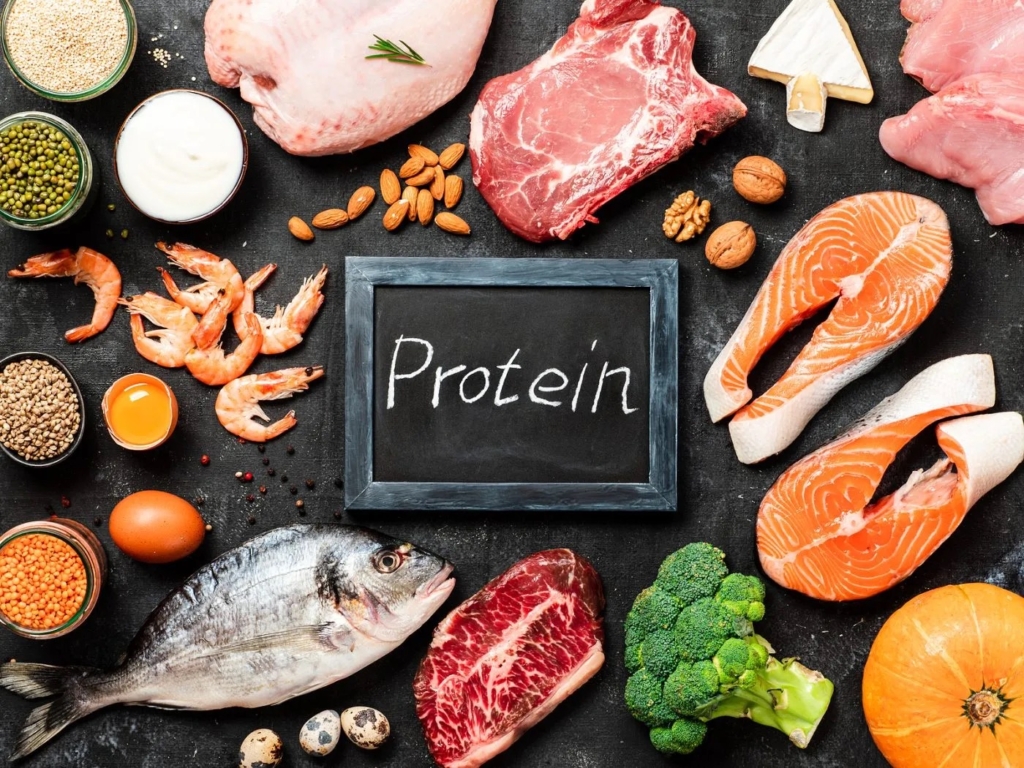
I think it’s safe to say, for most people losing body fat and increasing lean muscle is an ideal achievement for overall health and fitness. The question is how do we accomplish such a feat?
When talking about nutrition, we’ve all heard jokes about the stereotypical personal trainer pushing their clients to eat more and more protein. The fact of the matter is, maybe we should pay a bit more attention to that advice, especially if our goal is to lose body fat and get stronger at the same time!
Protein is the single most important nutrient for weight-loss, a better looking body, and aging gracefully. You heard me right, protein is key to changing your overall body composition. Of course there are other important factors that play a role as well, such as following a progressive strength training program and staying within your personal caloric boundaries. But today, our focus is on the different ways protein changes how we feel and look, as well as the effects on our overall health.
A high protein intake increases metabolism (burns more calories naturally), reduces appetite, maintains lean muscle mass, and affects hunger related hormones. Most people would agree those are all extremely important factors when considering body composition!
Let’s take a look at how this process works.
1. Digesting and Metabolizing Protein Burns More Calories
After you eat your body needs energy to digest foods, this is called the “thermic effect”. Protein has a much higher thermic effect than carbohydrates and fats.
2. Protein Makes You Burn More Calories While Doing Nothing
Due to this high thermic effect, there is an increase in your metabolism (energy used) around the clock. Yes, even while you are sleeping!
3. Protein Reduces Appetite So You Eat Fewer Calories
Numerous studies show that when you increase protein consumption there is a decrease in other calorie consumption. This higher satiety makes it easier to restrict calories without having to count them all the time.
4. Protein Cuts Cravings and Late-night Snacking
Let’s face it, cravings sabotage any good eating plan and can be our worst enemy. Interestingly, protein can have a powerful effect on both cravings and desire to snack at night.
Last point, and possibly the most important of all for those of us who want to slow down the aging process.
5. Protein not only helps our muscles repair and grow, it also helps to prevent muscle loss and metabolic slowdown.
I can’t emphasize enough the importance of this when it comes to aging well. Each decade, starting at 30, we will lose approximately 3-8% of our lean muscle and that number increases rapidly as we age. Pretty simple, losing muscle mass equates to a decrease in energy used and thus increase in body fat, accelerated over time. Ouch! Eating plenty of protein and participating in a strength training program can greatly decrease this loss over time and even help to build more lean muscle. Bottom line, a high protein diet combined with consistent strength training, is key for weight loss and body composition especially as we age.
So How Much Protein is Enough?
The latest research suggests the amount of protein needed is much more than most people would think. Studies suggest getting 30% of your total calories a day from protein sources. So what does that mean for you? Here is a sample equation to find the amount of protein you need based on your weight.
.7-1g per pound of lean body mass or 1.6g per KG of body weight (2.2kg per pound)
Example: 150lb person should get 105-150g of protein per day!
Keep in mind these numbers don’t need to be exact and the protein should be spread out throughout the day.
Final Thoughts:
There is no doubt about the importance of incorporating a high protein diet into your body composition goals. However protein alone is not the only answer. The magic happens when it’s combined with a strength training program and proper caloric consumption based on your age and goals!
Are you looking to change your body and need help with exercise and nutritional guidance? We are here for you, contact us today to get set up for a free consultation with one of our highly experienced personal trainers!!
Reference Articles: https://www.healthline.com/nutrition/high-protein-diet-plan#TOC_TITLE_HDR_2
